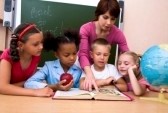 Early in age, we are taught that experience is the best teacher. Question is: does experience define what we look for in a great educator? In days of old, it did. In today’s time, that idea is shifting. Now, we are looking for teachers with talent regardless of previous experience. To create a full listing of talents or skills that teachers’ need may be impossible. They change based on exposure and/or experiences. Some of the talents include having a passion for teaching and having an ability to show their students that passion. Teachers need to be talented communicators with an ability to interact with people of all ages and they must be problem solvers. Thinking on their feet is a necessity. Being supportive and having patience are also talents. Teachers who possess these few talents are separated from those who don’t. They are easily seen as teacher-leaders who are conscious about the way they carry themselves in the face of students because they understand that students watch and mimic what they see.
Early in age, we are taught that experience is the best teacher. Question is: does experience define what we look for in a great educator? In days of old, it did. In today’s time, that idea is shifting. Now, we are looking for teachers with talent regardless of previous experience. To create a full listing of talents or skills that teachers’ need may be impossible. They change based on exposure and/or experiences. Some of the talents include having a passion for teaching and having an ability to show their students that passion. Teachers need to be talented communicators with an ability to interact with people of all ages and they must be problem solvers. Thinking on their feet is a necessity. Being supportive and having patience are also talents. Teachers who possess these few talents are separated from those who don’t. They are easily seen as teacher-leaders who are conscious about the way they carry themselves in the face of students because they understand that students watch and mimic what they see.
A great philosopher who focused on the study of societal influences and schools suggest that learning is impacted more by society influences rather than school itself.
“When the school introduces and trains each child of society into membership within such a little community, saturating him with the spirit of service, and providing him with the instruments of effective self-direction, we shall have the deepest and best guarantee of a larger society which is worthy, lovely, and harmonious” (Dewey, 1899, p. 28).
What educational problems and possibilities are presented to teachers by these cultural contexts, and why are they viewed as problems and possibilities to todays’ educators? What difference can and should teachers make for learners since schools are secondary to the wider society in their influence? The major problem that can be presented is the use of teachers in the classroom who lack talent. There will be no respect of culture which will lead to a misunderstanding of student need. Issues may arise in school that could be seen as behavioral rather than cultural. As a result mislabeling, changing educational environments, increased drop-out rates, decreased economy, etc. will develop. This is a phenomenon for all cultural environments. Talented teachers must seek to understand cultural background and traditions that students come to school with. They will make huge differences in the learning of their students when they integrate aspects about student culture/society into their daily lessons. Students will be more apt to volunteer their attention and learning will increase.
Dewey, (1899) shared the following quote as he ventured to reform what was known as public school:
“The school,” he wrote, “must be made into a social center capable of participating in the daily life of the community . . . and make up in part to the child for the decay of dogmatic and fixed methods of social discipline and for the loss of reverence and the influence of authority. Children were to get from the public school whatever was missing in their lives elsewhere that was essential for their balanced development as members of a democratic country" (Slideserve.com, 2012).
Please visit http://ebookbrowse.com/dewey-school-and-society-pptx-d261541724 to learn more about John Dewey.
References:
http://www.slideserve.com/titus/school-and-society-by-john-dewey http://ebookbrowse.com/dewey-school-and-society-pptx-d261541724
